CAR's archbishop and imam in peace drive
- Published
Religious leaders are working together to try to end the bloodshed
The conflict in the Central African Republic (CAR) is often described as being between Muslims and Christians but two religious leaders are working together to end the bloodshed that has displaced about 20% of the population. The BBC's Tim Whewell joined them on one of their trips to promote peace.
The archbishop finishes tying luggage to the roof of the 4x4, and climbs into the driver's seat. "The task is hard," he says. "But for God, nothing is impossible."
The chief imam, beside him, smiles in agreement. And with that, they're off - on a dangerous journey into the interior of their country, to try to reconcile two communities divided by hatred.
To say the task is hard is an understatement. Their country is the scene of what the United Nations (UN) has called ethnic and religious cleansing on a massive scale.
Hundreds of Muslims have been murdered, hundreds of thousands forced to flee the country by a militia that is usually described as Christian. They say they want revenge for atrocities committed against Christians by mainly Muslim rebels who briefly seized power last year.
You might think this is a conflict all about religion. But the archbishop and the imam insist it is not. And the first proof of that, they say, is their improbable friendship.
'The Twins'
It began last year when the imam, Oumar Kobine Layama, sought refuge at the residence of the archbishop, Dieudonne Nzapalainga, head of the Catholic Church in CAR, after receiving death threats from the anti-Muslim militia, known as the anti-Balaka.
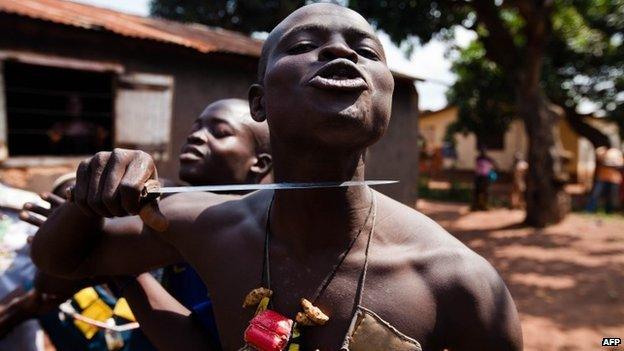
The anti-Balaka say they are avenging the killing of Christians
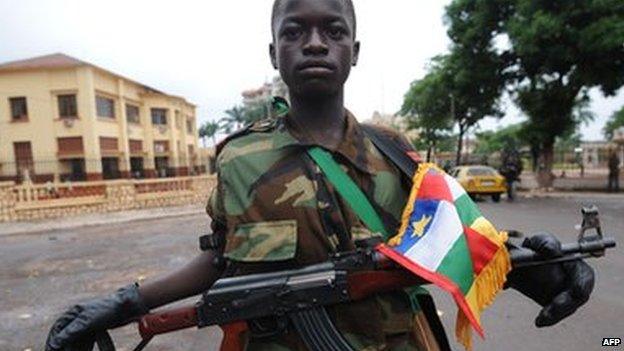
Mainly Muslim Seleka fighters captured power in March 2013 but were ousted in January
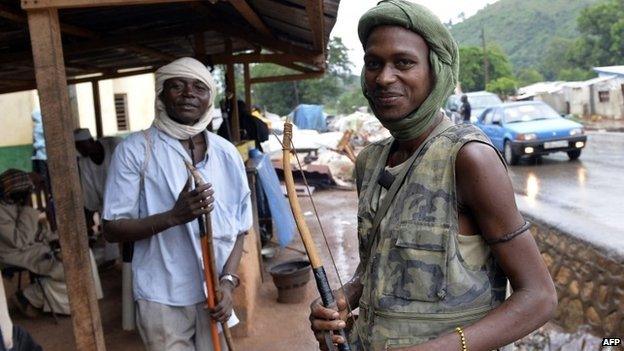
Traditional weapons like bows have also been used in the conflict by both sides
Later his house - like the houses of thousands of other Muslims - was burned and looted.
The archbishop and the imam became constant companions, travelling to Western capitals together to draw attention to a conflict they believe has been largely ignored by the outside world.
"The press have coined the phrase: 'The Inseparables'. Others call us 'The Twins'," Imam Layama says with a smile.
'Mercenaries'
Their relationship is a reminder of how, until recently, there was little open conflict between Christians - the overwhelming majority in the country - and Muslims, who account for about 15% of the population.
"When I was a child, I went to school with Muslims. We played together, ran around together," says the archbishop. "On feast-days we gave one another presents."
It is a measure of how much mixing there was that the chief imam himself is from a Christian family. He converted to Islam as a student.
"Nowadays," he says, "there's no tribe in Central Africa that doesn't have at least one Muslim among them."
The violence began as Seleka rebels, mainly Muslims from the north-east, fought their way south to the capital, Bangui, last year, killing and burning, often at random, along the way.

The capital Bangui has been badly hit by the violence
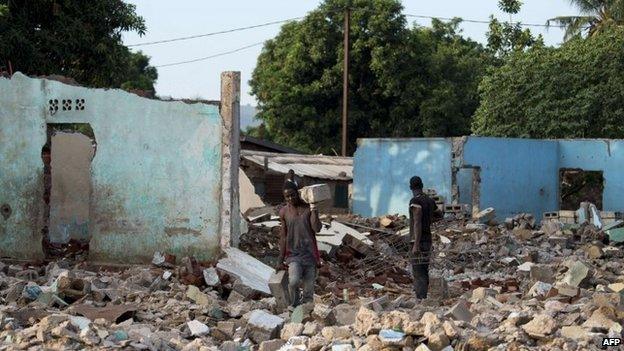
Mosques such as this one have been destroyed, as well as churches
"They recruited mercenaries from Chad and Sudan," Imam Layama says.
"A mercenary who is not on his home ground only comes to get rich, to steal. He can't go home without loot. So the mercenaries set an example which local Muslims followed."
But while only some Muslim civilians became accomplices of Seleka, all are now paying the price.
On their journey, the archbishop and the imam - accompanied also by a Protestant leader, Pastor Franco Mbaye Bondoi - pass village after village where all Muslim homes have been destroyed by the anti-Balaka militia. Their owners have mostly fled to Chad or Cameroon.
'Exploited'
"We got on well with the Muslims, but with the entry of the Seleka into politics, all the Muslims joined the Seleka and they killed, abused and stole everything," says Anicet Bomesse, an anti-Balaka leader in Bangui.
"I lost my mum and dad, most young people you see here lost their loved ones. So the only thing we want is for there to be no Muslims in Central Africa."
The anti-Balaka consists of informal groups of young men armed mainly with machetes, bows and arrows and old hunting rifles. In the past they were used mainly to protect the roads against highwaymen.
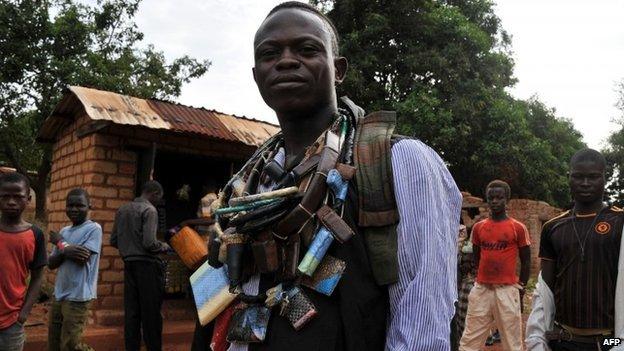
Some men wear charms, believing they offer protection
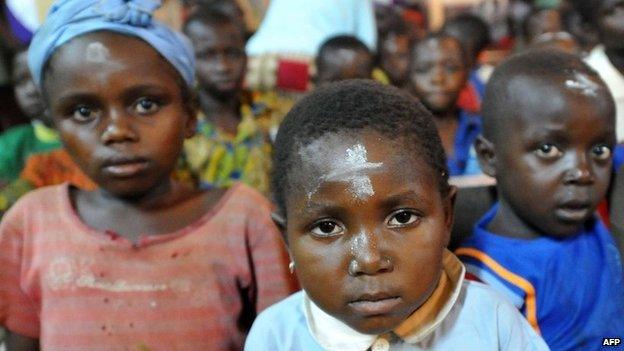
The violence has displaced hundreds of thousands of people
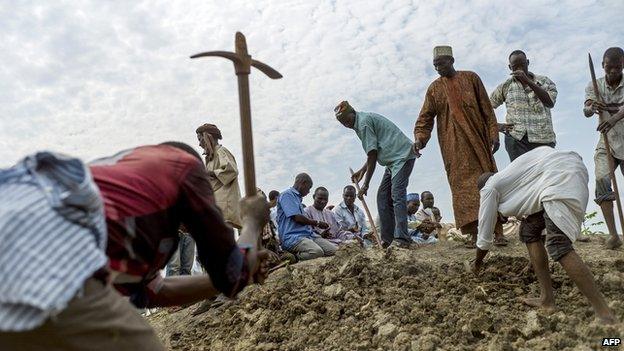
Mass funerals have taken place to bury the thousands of people killed in attacks
But the archbishop says they are now being encouraged behind the scenes by former Christian politicians who want to come back to power.
"The politicians exploited them, gave them a bit of money and said: 'Go for it,'" he says. "They're told that it's a war of religion, but we reject that."
'Breaking up'
But it is not easy to convince those they meet on the journey that it is not about religion. In each town, the clerics hold long, earnest meetings with local anti-Balaka groups, trying to persuade them to disband and go home.
But the fighters are not convinced. They say they have liberated CAR from Seleka, and now deserve some reward.
One group of anti-Balaka fighters that Imam Layama bravely approaches tell him they will not go home because their only income now is extorting money from travellers at an informal checkpoint they have erected across the road.
The archbishop and the imam do not have much success, either, when they try to persuade the few remaining Muslims of Bossangoa, a town north-west of Bangui, to stay - and not follow others across the border into Chad.
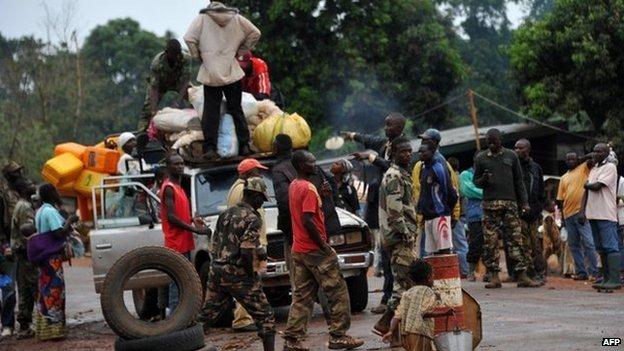
The anti-Balaka have set up checkpoints in areas under their control
"The last time a meeting like this was organised with an imam in front, a lot of fighting started three days later," one Muslim at the meeting complains.
The archbishop and the imam point to communities where Muslims and Christian still live side-by-side.
One is Bangassou, the archbishop's home-town east of the capital. And they are glad that wherever they have gone, people have listened to them respectfully.
But after four days on the road, as they head back to Bangui, they are aware of how much more there is to do.
If the campaign of religious cleansing continues, the imam says, the country may be effectively partitioned - with Muslims in the east and only Christians in the west - and that may provoke a wider conflict involving CAR's neighbours, particularly Chad.
"The country is in great danger," he says. "We have to try to avert it using all means possible, to avoid ending up in a war that is tribal, ethnic - and regional."
That means a lot more reconciliation work ahead.
"It's the old story of the young man with his fiancee," the archbishop says. "I come to you and you refuse me, so I come back again - and I'll keep coming back till I hear you declare your love for me."
